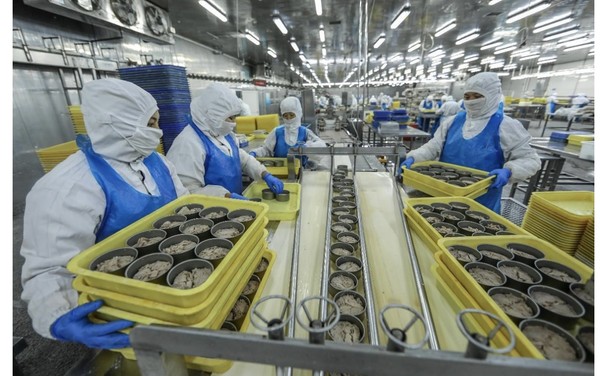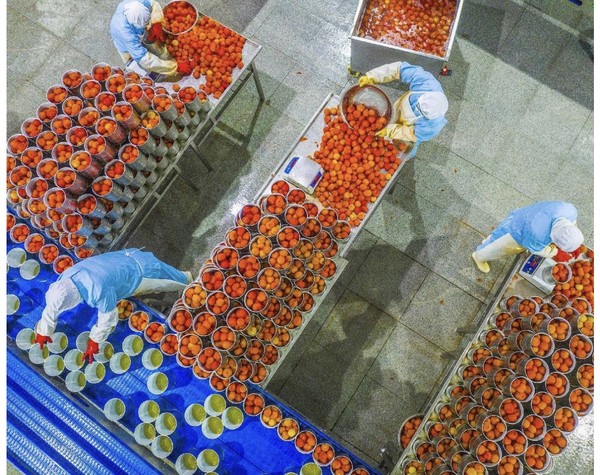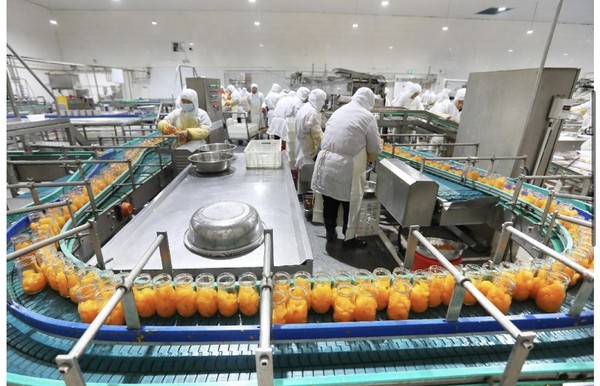By Li Jie, People's Daily
Canned food is absolutely nothing new. This traditional food processing industry is one of the earliest industries in China to be geared to international standards and market.
China has remained the world's largest producer and exporter of canned food for years, selling the product to nearly 200 countries and regions.

As a matter of fact, canned food was once a symbol of high-end consumption when it just entered China. In 1950s, China's canned food was exported for the first time. In the beginning, the country sold a small amount of canned fruits to foreign destinations, and later the variety and quantity expanded year by year. Today, about a quarter of the world's canned food is produced in China.
The country accounts for 70 percent of the total exportation of canned asparagus in the world and is a global leader in the production of canned tomatoes. Besides, it is the only country in the world that produces canned braised pork and canned mud carp.
Last year, China exported nearly 3.13 million tons of canned food, with a value of $6.89 billion. Both numbers hit a record high in the recent six years.
"China enjoys rich resources. Its canned food production, which has a strong reputation for quality and a comparative advantage in price, is growing year by year. This has built a sound environment for the exportation of Chinese canned food," said Liu Youqian, director general of the China Canned Food Industry Association.

Ningbo Today Food Co., Ltd. is a major tuna processing enterprise in east China's Zhejiang province. Founded in 2000, the company has sold85 percent of its products to overseas destinations in the past 20 years. Its annual exportation hits 700 million yuan ($101.79 million) to 800 million yuan.
"Our production is stable and there's a huge market demand. We have developed fast in the past 10 years," said Chen Yifang, chairman of the company.
Food processing companies have high dependence on raw materials. The development of China'spelagic fishery has brought significant opportunities to such companies..
"Catching, shipping and unloading go before tuna processing. Boasting new equipment and freezing facilities, Chinese fishery vessels can better keep the freshness of raw materials and ensure the quality of processed products," Chen told People's Daily, adding that the industrial advantages, together with the advantages in logistics, infrastructure and price, have created a sound environment for the development of food processing enterprises.
Canned orange is a star product among Chinese exported canned food. Yiguan Food Co., Ltd. located in Taizhou, east China's Zhejiang province is a time-honored player in the canned fruit industry. According to the general manager of the company Huang Hongge, the global annual exportation of canned orange stands at around 350,000 to 400,000 tons, over 250,000 tons come from China.
"Relying on the advantages in raw material and processing brought by the development of orange industry, Chinese canned orange manufacturers have stood out from their global peers," Huang said.

Canned food processing is a typical labor-intensive industry that needs a huge amount of workforce and thus faces challenges from rising cost. Thanks to constant technological innovation, Chinese enterprises have gradually gained an edge in this regard.
"China had once introduced peeling machines from Spain. However, they didn't work well as Chinese orange varieties are different from foreign ones. After more than a decade of cooperation with research institutes, we finally developed automatic peeling machines that suit Chinese oranges. In the recent couple of years, we have also improved automation in orange segmenting," Huang told People's Daily.
According to him, it took 90 days for 4,000 workers to produce 20,000 tons of canned oranges, but now 30,000 tons can be produced by only 2,000 workers within the same time period.
Automation and intelligent manufacturing are sweeping the canned food industry, said Liu, explaining that major products of the industry are now processed by automatic production lines, which not only improves efficiency for enterprises, but also expands production capacity and reduces labor cost.
What's encouraging for canned food manufacturers is that the industry is embracing a long-awaited opportunity as ready-to-cook food gets trendy. Sterilization and sealing, two procedures of canned food processing, are of vital significance for the production of ready-to-cook food. Besides, canned food has been considered important by consumers as an emergency supply since COVID-19 broke out. More and more manufacturers have started making canned Chinese cuisines and canned healthy meals, and the packaging form of cannedfood has shifted to plastic and paper bags.
Ready-to-cook food enjoys broad prospects and a bright future in the international market, said Liu.

